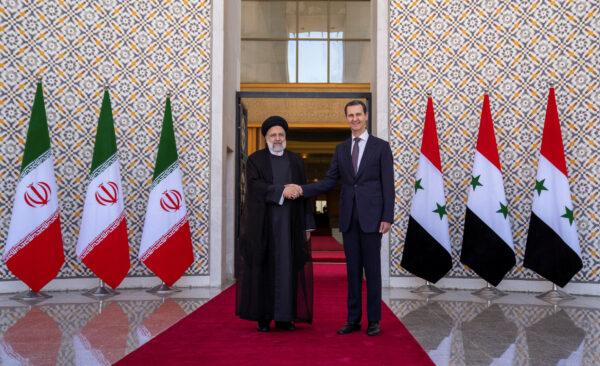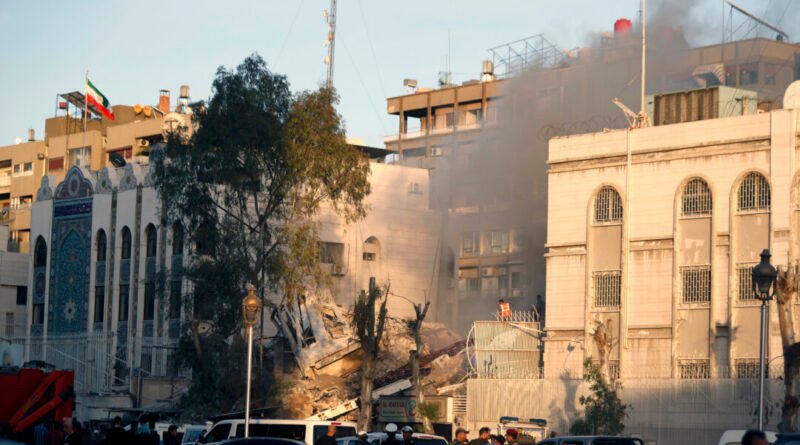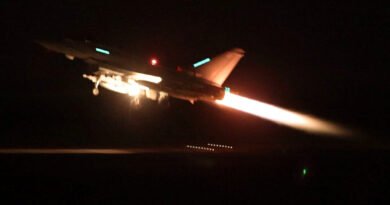Iran pledges to retaliate following alleged Israeli airstrike on Damascus consulate
An Israeli military spokesperson stated that the targeted building had a military function and was not diplomatic.
After a suspected Israeli airstrike killed seven Iranian military officers in Damascus and six Syrian nationals, Tehran has promised a severe response.
Iranian President Ebrahim Raisi stated on April 2, “Having failed to destroy the will of the resistance front, the Zionist [Israeli] regime is again resorting to indiscriminate assassinations.”
He further added, “This cowardly crime will not go unanswered.”
Warplanes reportedly struck Iran’s large diplomatic compound in the Mezzeh district of Damascus, resulting in the death of seven Iranian military officers.
Syrian Foreign Minister Faisal Mekdad condemned the attack as an “atrocious terrorist attack” during a visit to the bombed-out compound.
The IRGC confirmed that a top commander of the IRGC’s elite Quds Force and his deputy were killed in the strike.
The death toll was later updated to include six Syrian nationals who were present in the area during the attack on April 2. Iran was quick to accuse Israel, its regional enemy, for the deadly incident.
In televised comments, Iranian Ambassador to Syria, Hossein Akbari, who was unharmed in the attack, stated that Tehran’s response would be severe.
The Iranian mission to the United Nations labeled the strike as a “threat to regional peace and security,” emphasizing Tehran’s right to deliver a decisive response.
The mission condemned the attack as a “flagrant violation of the UN Charter, international law, and diplomatic premises’ inviolability.”
Lebanon’s Hezbollah militia, closely aligned with Iran, also pledged to retaliate against the crime.
“This crime will not go unpunished, and the enemy will face retribution,” the statement read.
Since 2015, Iran and Hezbollah have had a military presence in Syria, working in collaboration with the Syrian government and army.
Israel accuses Iran and Hezbollah of using their military resources in Syria for cross-border attacks on Israeli targets.

Mixed Signals
Israel typically refrains from commenting on attacks carried out by its forces on targets abroad.
An Israeli military spokesperson initially stated, “We do not comment on reports in the foreign media” when questioned about the Damascus strike.
However, four unnamed Israeli officials, as cited by the New York Times, appeared to imply Israel’s involvement in the attack.
The Epoch Times could not independently verify these claims or those made by anonymous sources.
In an interview with CNN on April 2, Israeli military spokesman Daniel Hagari stated that the strike in Damascus targeted a military, not diplomatic, building.
He told the broadcaster, “According to our intelligence, this [target] is not a consulate or embassy. This is a military building of Quds forces disguised as a civilian building in Damascus.”
The Epoch Times could not independently verify Mr. Hagari’s statements.
Since its establishment in 1948, Israel has engaged in three major conflicts with Syria, with which it remains in a state of war.

Moscow Says Strike ‘Unacceptable’
Israel has frequently carried out strikes on Iranian and Hezbollah-linked targets in Syria, as well as Syrian army positions, in recent years.
Last October, warplanes simultaneously attacked Damascus and Aleppo international airports, damaging runways and causing flight cancellations.
However, the strike on April 1 was the first time a diplomatic mission in Syria faced an attack, possibly indicating a shift in Israel’s conflict with its regional foes.
The attack received condemnation from key regional states, including Iraq, Pakistan, Saudi Arabia, Qatar, and the United Arab Emirates.
Russia, which has a military presence in Syria under the Syrian government’s invitation, labeled the strike as ‘unacceptable.’
Russia’s foreign ministry released a statement on April 1, saying, “Such aggressive actions by Israel are absolutely unacceptable and must end.”
The statement added, “We urge Israel’s leadership to cease provocative military actions in Syria and neighboring countries.”
Russia’s embassy in Tehran also expressed shock and outrage over the strike, denouncing it as a gross violation of international norms.
Reportedly, Moscow has called for a UN Security Council meeting on April 2 to address the incident and its implications.
On the other hand, the response from U.S. officials has been more restrained.
State Department spokesman Matthew Miller declined to comment immediately after the strike, stating, “We need more information.”
“As a general principle, we are concerned about escalation. We are concerned about anything that could expand or intensify the conflict between Israel and its adversaries,” he told reporters on April 1.
Reuters contributed to this report.






